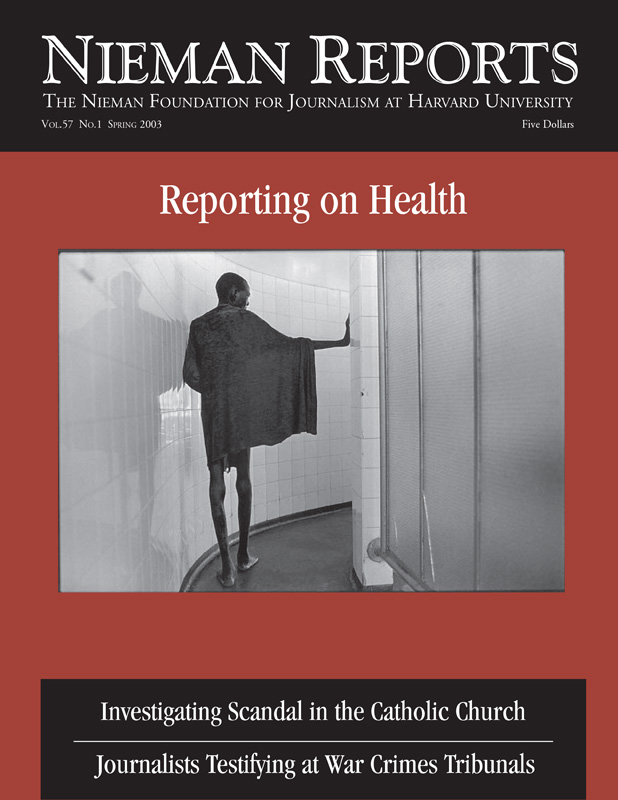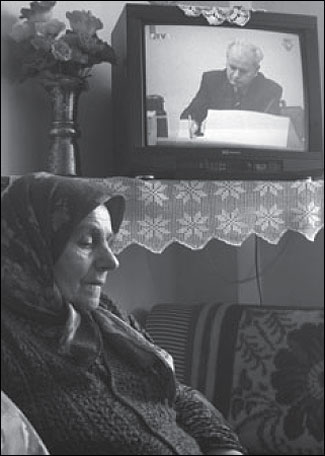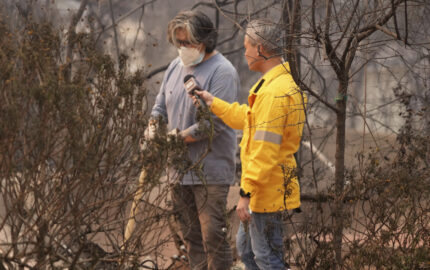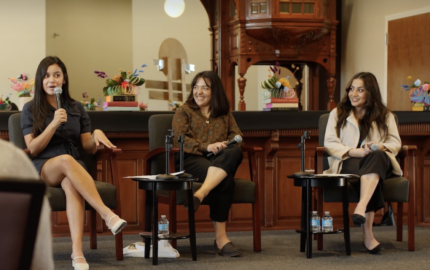
Reporting on Health
Few topics receive more media attention today than the topic of health. Yet, in the view of some journalists, many of the stories being told about health are not ones journalists want to tell or that members of the public need to hear. As Andrew Holtz, a freelance health reporter and president of the Association for Health Care Journalists, observes, “… stories I think need to be told, are often not the ones that easily sell. My personal frustration is not the issue, but we should be concerned when journalists are inhibited from the work of sustaining an informed and involved citizenry.” – Melissa Ludtke, Editor

In its decision to quash the bizarre order that former Washington Post reporter Jonathan Randal testify to the veracity of an interview he had done 10 years earlier, The International Criminal Tribunal for the Former Yugoslavia was attempting to curb the powers of the prosecutor in an area in which they were undefined and expanding without check.
Prosecutor Carla Del Ponte chose, however, not to yield, and two months after the appeal’s ruling she renewed her demand for Randal’s testimony. The Randal case has thus turned into a test, not only of the relationship of journalists to international justice, but also of the functioning of the first U.N. criminal tribunal set up since the Nuremberg trials. Moreover, it has been a wake-up call to our profession, which put aside its usual anarchy and rallied behind the notion that journalists deserve procedural protection before this court.
Now it is time for a more rigorous discussion about journalists and the court, particularly in light of the creation of the U.N.’s permanent International Criminal Court (ICC). It is vital that this permanent court adopt the protections implicit in The Hague court’s ruling regarding journalists’ testimony and that it recognize the unique role journalists play in exposing war crimes.
The Randal case presented a special challenge to the lawyers for the Post, for they were well aware that in summoning this most accomplished of reporters, the tribunal was following through on Randal’s own written agreement to appear. This was, on the surface, a pretty weak case; it is tough arguing your way out of a signed commitment.
In fact, Randal’s case was inherently stronger than it appeared, for the underlying question is how did the prosecutor’s staff obtain his signature in the first place? Having spoken at length to another reporter who signed a similar statement, I would posit that the prosecutor’s office has developed a routine in approaching journalists that leads at the end of an interview to a form of entrapment. I base this on a small sample—of two. But the method in both cases was identical.
And therein lies the story behind the story. This important new United Nations’ institution has been purring along with scarcely any oversight from the news media. Until the Post mounted its challenge, the major journalistic organizations had shown minimal interest in whether reporters testify or not. Let us hope the journalistic organizations will remain engaged. At the same time, reporters have to be more aware of what they are dealing with in talking with tribunal prosecutors. Whether the United States continues the Bush administration boycott or eventually agrees to join, the ICC is a reality, and news media should begin focusing on it. And, finally, news organizations should cover these proceedings with more skepticism.
The Prosecutor and the Journalist
This is not a jeremiad against The Hague tribunal, for any reporter who covered the crimes of the four Balkan wars from 1991 to 1999 has to view justice after such suffering as an advance for civilization. Between the closing of the Nuremberg Tribunals and the opening of The Hague, international justice existed largely in theory. The failure to prosecute no doubt was viewed by violators as a green light. Although The Hague tribunal and its Arusha branch for Rwanda were established by Western leaders partly to compensate for their fecklessness in Yugoslavia and Rwanda, these tribunals have taken on a life of their own. Their proceedings have helped not only to bring some justice where there had been genocide, but also to strengthen the law, set precedents and, one hopes, deter future such crimes.
Nevertheless, like any other institution, these courts need watchdogging. And they are not getting it. I reported (in Newsweek) in August 2001 that one of The Hague tribunal’s indictments against a Croatian general stated charges that were 180 degrees at variance with what I and even the spokeswoman for the tribunal, Florence Hartmann, had reported (for Le Monde) at the time and knew to be the case. I never saw a follow-up or a rigorous examination by Hague-based reporters of this flawed indictment. I must presume this is not the only case like this. The tribunal has also had to drop other charges and cases, and its prosecution of the highest profile case, of Serbian strongman Slobodan Milosevic, is far from airtight.
Randal’s case illustrates the problematic side of international justice. Unbeknownst to him and to his lawyers, the prosecutor’s office had developed a system for interviewing reporters that ends up with a signed agreement to appear in court. To understand the method, you have to understand the psychology. Given our tools of the trade, it is amazing that a journalist can, with a notepad and ballpoint, expose the worst criminals of our time and see them land in the dock. Now imagine that a member of the prosecutor’s staff asks for an appointment and holds a long interview in which the journalist—who is now being regarded as a witness—recounts the context, content and significance of his/her coverage.
In the case of Dusan Tadic, it was a German reporter who uncovered both his role and whereabouts with the result being the arrest and prosecution of the first defendant before The Hague tribunal. But there were so many witnesses in Western Europe that the prosecutors never debriefed this journalist. Late last year, the prosecutors discovered their lapse, made contact with this journalist, and did about 12 hours of interviews during several days.
During their interviews, prosecutors pushed these journalists to relive those hours of history-making reporting, to recount their roles, and try to recreate the context in which they operated. If their emotions were not engaged, they are not human. Next, the prosecution staff wrote up a memo on what the journalists said and asked them to sign it with an agreement that should there be a challenge to its content, the journalists would address the court. My German reporter friend signed. So did Randal. There was no discussion about the implications, and both Randal, a retired Post staffer, and my German colleague, a freelance journalist, saw no obvious conflict—nor were they warned of any. A staff reporter might have had a different reaction, as have I, namely to check with my editors before committing myself to anything.
Consequences of Journalists’ Testimony
Let us hope that practices like this will end given the recent decision in the Randal case. But I would like to see the prosecutor’s office draw back from its use of reporters’ testimony in general. There seems to be an underlying view, even among the first-rate U.S. Justice Department and military prosecutors sent from Washington to The Hague and Arusha tribunals, that reporters should take the stand to reaffirm their coverage. This view has been encouraged by the tendency, particularly among British reporters, to submit to every request and provide everything they have to the tribunal.
Here is what can result. In the Dusan Tadic case, Britain’s ITN television provided not only the televised tapes, but also the untelevised film of their famous visit to Omarska and Trnopolje camps in August 1992. The defense made the material available to a supposed “expert” witness. Based on these outtakes, this witness subsequently published articles alleging that ITN had “set up,” i.e., staged, its famous images of starving detainees. ITN sued the magazine that published these assertions for defamation and, after a long and costly battle, won in court. This was an improper use of discovered or disclosed journalistic material with consequent chilling effects on free speech.
The second example involved Ed Vulliamy, formerly with The (London) Guardian. When he testified in the case of Milan Kovacevic, on trial for his role in running the Omarska death camp, Vulliamy was subjected to cross-examination that went far beyond the charges. No surprise, for the defense attorney had told a New York Times reporter, “We’re going to roast him alive.” After he testified for a half day about his interviews with Kovacevic, Vulliamy was cross-examined for three-and-a-half days by the defense, who demanded access to his shorthand notes. The judge so ordered. The defense attorney then started examining the original notebooks, found the names and numbers of contacts unrelated to the case, and began asking more detailed questions. This was a classic fishing expedition. Vulliamy cooperated. He would do it again.
Make no mistake: Many reporters, myself included, feel a moral obligation to assist the tribunal, as reporters frequently do with local district attorneys and prosecutors in domestic settings. The question is whether one should take the stand to attest to the veracity of an article one wrote years earlier. My own standard is that if my testimony would make the difference between conviction and release of a person I know was a killer or the planner of killings, I would testify out of conscience. Short of that substantive role, it seems to me I am either there to self-advertise my role in nailing the culprit, being used as window dressing for a weak case, or being made vulnerable to a perfectly legal demand for discovery by the defense and, where that ends, heaven only knows. I would not, as Vulliamy did, make my notes available to the court.
But there is another reason for suggesting the prosecution alter its attitude. International humanitarian law is utterly different from domestic criminal law. These big crimes—repeated violations of the laws of armed conflict (war crimes), the massive and systematic acts against civilians (crimes against humanity), and attempts to eliminate a people or nation in whole or in part (genocide)—are crimes committed by and on behalf of the State. The State acts not as prosecutor, but conspirator. Its top legal authority does not investigate, prosecute and incarcerate, but covers up and conceals. This is why war crimes have been beyond the reach of justice for most of the 20th century. Tribunals, at most, will punish a token number of top criminals and extensive trials will be staged only if there is a complete military takeover.
Journalists’ Broader Role
It is in this context that journalists play a much broader role than in domestic justice. At times journalism can have the same impact as a tribunal and a lot faster. A timely, well-documented, irrefutable exposé can pack such a wallop that the mere shining of additional multiple spotlights on a scene can change the behavior of the culprit. In this sense of exposing the truth, identifying the culprits, and most of all bringing the violation to a halt, the fourth estate at times can be a coequal branch with the third.
My own stories exposing concentration camps such as Omarska were followed a few days later by their closure. Elizabeth Neuffer’s courageous RELATED ARTICLES
"Roy Gutman’s Witness Statement"
"Elizabeth Neuffer’s Affidavit"exposés in The Boston Globe of indictees running around with impunity led to arrests and a change of policy. Neuffer said in her affidavit that her ability to report this and other stunning stories would have been greatly hampered if she knew she would have to testify later. My own argument was that I want to be able to assert my nonpartisanship on a story, and to do that I have to feel free to return to the scene and carry on reporting. If I testify, I think I will be identified with the prosecution.
My point is not special pleading or self-advertising, rather to relate that journalists often play a unique role in exposing war crimes, and it is in everyone’s interest that they continue doing that. The existing tribunals—and the new ICC as well—would be foolish to jeopardize this rare, almost magical, power of journalism, for it is in our common aim to see these crimes stopped. Thus, the media and the courts are effectively allies. So I am glad the tribunal made the right decision; now I would like to see journalists start covering the tribunal more rigorously.
Roy Gutman has reported on foreign affairs for Reuters, Newsday and Newsweek and was coeditor with David Rieff of “Crimes of War: What the Public Should Know,” published in 1999 by W.W. Norton & Company. He is currently a senior fellow at the U.S. Institute of Peace, researching a book on the Afghanistan civil war.


